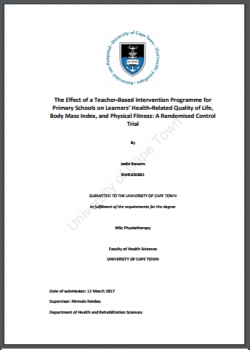The effect of a teacher-based intervention programme for primary schools on learner's health-related quality of life, body mass index and physical fitness : a randomised control trial

Type
Thesis
Authors
Category
Foundation, Intermediate
[ Browse Items ]
Publication Year
2017
Publisher
URL
[ private ]
Subject
Early childhood development (ECD), Children, Learners, Obesity, Physical fitness, Physical activity, Teachers, Physiotherapy, South Africa
Tags
Abstract
Background: Childhood obesity, a rising problem worldwide and within South Africa, has been negatively linked with both physical fitness (PF) and health-related quality of life (HRQoL). The school environment is the ideal setting for children to obtain the skills and knowledge to increase physical activity (PA) levels and healthy diets. PA and school-based nutrition intervention programmes have been shown to have positive effects on diet and PA behaviours in children. However, there is minimal literature reporting on the effectiveness of school-based interventions in a South African setting. Aim: The primary aim of the first phase of the study was to provide a contextual background regarding the provision of PA in school-based PE programmes within a small sample of schools from which the learners in the intervention study were drawn. The primary aim of the second phase of the study was to determine the effect of a teacher-based intervention programme after six weeks for primary schools with less than the mandated amount or no specific amount of PE on learner's HRQoL, Body Mass Index (BMI) and PF. Methodology: Ten schools were randomly selected from the circuit lists within the Port Elizabeth Education District. Ten staff members from the selected schools completed the School Environment Questionnaire in order to provide a situational analysis regarding the provision of PA in school-based PE programmes. A sample of 300 learners (aged nine to eleven) from four randomly selected schools participated in the pre-testing measures in order to establish the weight status (using BMI and waist circumference (WC)), HRQoL (using the EQ-5D-Y), and PF (using the Eurofit test battery). Class teachers, from schools with less than the mandated amount of PE or no specific amount of PE, who were part of the experimental group, implemented the intervention. In order to implement the intervention, they received training and were given a PE programme booklet. The PE intervention programme was in line with the Curriculum and Assessment Policy Statement teaching plan for life skills, and was based on targeting the deficiencies found in the pre-testing fitness measurements. Post-testing measures, using the same learners, were conducted six weeks later. The obtained results were analysed using STATISTICA version 12. Results: Phase one of the study revealed that PE was provided at all schools. The curriculum was followed by 90% of schools, but only 30% had teachers with PE qualifications. PE policies and practices were being developed and/or implemented in 70% of schools, and 50% had no specific amount of time mandated to PE or less than the mandated amount. Soccer was offered at all schools, and 80% of schools had access to an outdoor sports field and an outdoor paved area. Phase two of the study found that the control and experimental groups were not equivalent at baseline with regard to gender distribution, BMI Z-scores and interpretations, the EQ-5D-Y "looking after myself" variable, and the sit-up test. No positive significant differences were noted in BMI Z-scores, WC, HRQoL, or PF components in the experimental group after the six-week intervention. Discussion: The average duration of PE at 70% of the participating schools was longer than the national average, despite half of the schools not implementing the mandated amount of PE. Gaps in the curriculum content and unqualified PE teachers may have prevented learners from developing the necessary skills associated with PE, including the various components of PF. The six-week teacher-based intervention was found to be ineffective. Similar results were seen in other South African studies. Insignificant intervention findings may be the result of poor intervention implementation or compliance, time constraints experienced by participating teachers, and the short six-week duration of the intervention. Teachers mainly commented on the enjoyment of the intervention programme by the learners. Conclusion: This study concludes that the effects of the six-week teacher-based intervention, on primary school learners' HRQoL, BMI, and PF, was insignificant. Nevertheless, all schools provided PE, despite half of the schools not implementing the amount mandated. This study provides a platform for future studies in the attempt to reduce the occurrence of obesity in school children; thereby reducing its increasing national burden on health and the economy.
Description
Thesis (MSc (Med))--University of Cape Town, 2017
Number of Copies
1
| Library | Accession No | Call No | Copy No | Edition | Location | Availability |
|---|---|---|---|---|---|---|
| Main | 778 | 1 | Yes |

